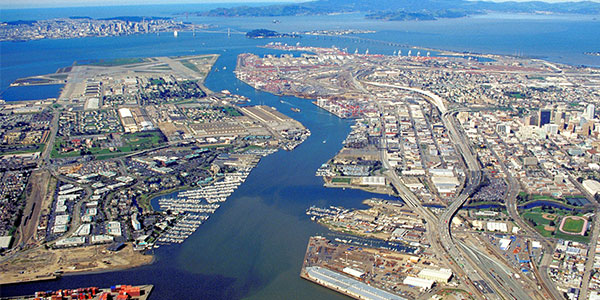By Hudson Sangree
FERC last week denied a request for rehearing by the city of Oakland against Pacific Gas and Electric for charging retail instead of wholesale power and transmission rates at the Port of Oakland, which maintains an extensive distribution network (EL18-197).
The city, acting through the port, had claimed PG&E violated the Federal Power Act by charging the higher rates and failing to file a wholesale service agreement with FERC. It said that since 1997 it had resold virtually all the electricity it received from PG&E to metered electricity end-use customers and that PG&E should have been aware of the situation and charged wholesale rates. (See FERC Denies Oakland Complaint.)
The city asked for a refund of the difference between the retail rates PG&E charged and the wholesale rates the city argued it should have paid for electricity it received between 1997 and 2017, when it signed a wholesale agreement with the utility.
In its Dec. 20, 2018 order, FERC denied the complaint, finding that the port’s claims lacked legal and factual support and that its request for a declaratory order was unwarranted. In particular, FERC said Oakland had failed to provide evidence, such as invoices, of its resale of electricity to end users. Moreover, the city never specifically asked PG&E to change its rates from retail to wholesale, and the utility did not have an obligation to do so on its own, the commission said.
“We do not believe that Port has substantiated its general claim that PG&E violated Section 205c of the FPA by failing to file a wholesale transmission and power sale agreement …,” the commission said. “Port’s statements to the contrary are speculative, not supported by the record evidence, and insufficient to meet its FPA Sections 206 and 306 burdens.”
“[E]ven if we were to find that PG&E violated FPA Section 205c as alleged by Port, we would not direct refunds here,” FERC said. “As noted above, Port had ample opportunity over roughly two decades to clarify the nature of the service it took from PG&E and failed to do so. We therefore do not think requiring refunds from PG&E would be appropriate.”
In seeking a rehearing, the city argued FERC should have either issued a declaratory order or scheduled a hearing because the city had established a prima-facie case under commission regulations. The city contended FERC had failed to engage in reasoned decision-making and disregarded evidence.
FERC disagreed, saying the city had offered only a single photo of unmarked meters to show it was making wholesale sales and had failed to establish a prima-facie case.
“PG&E thus was not required to rebut Port’s purported evidence — i.e., the photograph showing its meters — on this point, and the commission was not obligated to set the issue for hearing,” FERC wrote.




